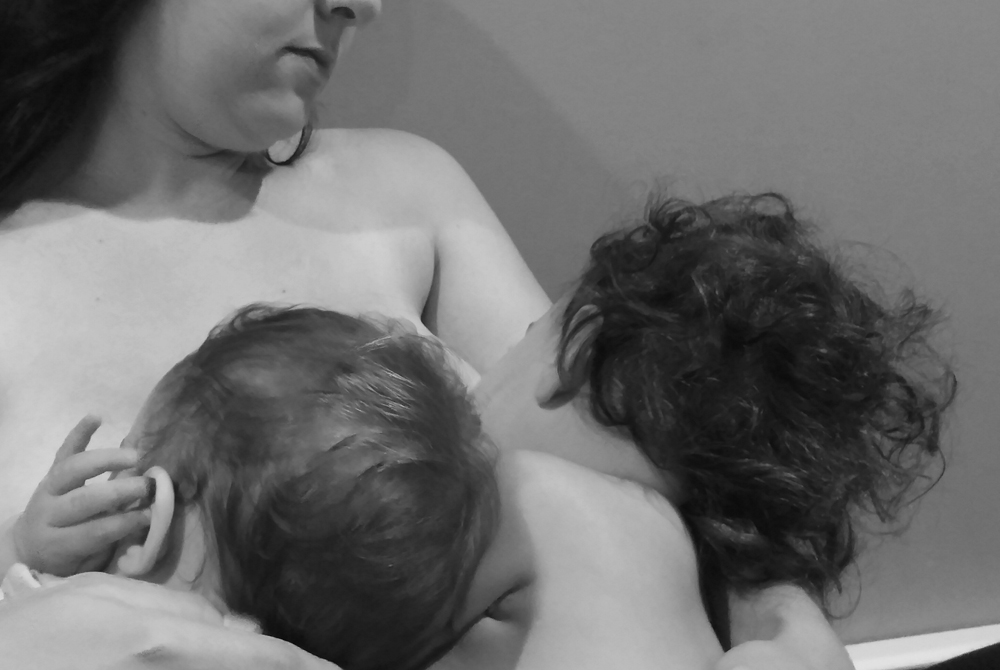I Hate Breastfeeding. Ok. Not really….all the time, but definitely some of the time. I was a one woman lactose factory for the better part of nearly nine years. I can say without shame that there were times, even whole days and maybe even weeks during which I utterly (that pun may be subconsciously intended) and completely hated breastfeeding.
Don’t get me wrong I loved all the benefits of providing nourishment to my children. I’ve even had the opportunity to provide nourishment for the children of others in my birthing community. And it’s awesome. It’s got some really positive benefits associated with it and that’s great. But there is this other, less wonderful side that people rarely talk about. So here it is, the truth people don’t tell you about-
Ten Reasons I hate Breastfeeding
(and some helpful info too)
10. There is no stomach sleeping- Between pregnancy and nursing, I spent 9 years of my life sleeping on my back or sides. For someone who was a lifelong belly sleeper, this was rough. My body hated it and I often had the strong desire to roll onto my belly. The problem is you just can’t do this when you are breastfeeding because it will result in clogged ducts (see number 2).
9. Interrupted sleep- Now I know part of this is my parenting style and the fact that my kids all co-sleep/slept with me. But seriously, I’m the one getting up to feed the kids EVERY. SINGLE. NIGHT! I know, I know. I could pump (see number 6), but if my babies are crying or unhappy I’m not sleeping anyway, so I might as well be feeding them. Truth is, breastfed babies tend to wake more often at night than formula fed babies. Formula is harder for a baby’s body to breakdown, so there tends to be more time between feedings. All babies outgrow night feedings eventually, breastfed babies naturally wake at night through two years of age. I imagine if you stop adding to your brood you get to sleep again some day before you die. I’ll let you know if I ever get there.
8. Those last 10 “prebaby” pounds- Breastfeeding is an awesome way to lose lots of baby weight at first. Your body will be a furnace working around the clock. The average nursing mothers burns 500-600 extra calories a day (according to Le Leche League). The hormone prolactin, while necessary for milk production, also makes us more hungry. So it may be that more calories are being consumed than are necessary. However, in order to provide the nutrients necessary to sustain the life of another human being, a woman’s body will slow down her metabolism if there are not enough calories being consumed by the mother. Finding the right balance here is tricky and often times women don’t lose those pesky final pounds until after the baby weans. Remember, your body needs lots of water, rest and good nutritious food. The weight loss will come with time.
7. Not being able to wear what you want- Whether you are with your baby or planning for pumping at work, you always have to think sensibly. Read that to mean, you need to make sure you have easy access to your breasts. Nursing tops and bras are great and make this easier, but styles are limited and who wants to invest in yet another complete wardrobe? Have a few pieces you really like and add accessories, cardigans or shirts on top to help spice things up.
6. Baby gymnastics- As they get older, babies become more mobile. They love to squirm, climb, roll and generally engage in all manner of gymnastic moves while nursing. There is nothing quite like having a little one latched to the breast, with one foot on your shoulder, the other twisting behind them, hands all about. It’s tough and can be awkward especially if you are trying to nurse discreetly in public. Don’t worry though, you and your little one will figure out the changing mechanics. Babies can be taught what is acceptable and what is not. Sometimes, it’s just a matter of hooking their limbs in just the right way to keep them still. If you don’t like what the baby is doing, firmly tell them no and stop the nursing session for a few minutes. It usually only takes a few rounds of this for the baby to settle in.
5. Pumping- I returned to work four months after my first daughter was born. With the first go around, I didn’t mind pumping. Honestly, it was something I did because I felt it was best for my baby. It was important to me and that made it worth it. The subsequent experiences posed more difficult in terms of self-deception.
Pumping presents a lot of challenges. You are strapped to a seat, you increase the chances of getting clogged ducts, it gets lonely because people are super uncomfortable being in the room with the human cow, it takes time out of your workday which you have to make up somewhere, and if you forget the parts you need you end up almost screwed (see manual expression).
I found a new pump that makes these challenges suck less. Freemie pumps allow you to pump with your shirt on and I haven’t had problems with clogged ducts.
4. Leaking- Real life struggle of the nursing mom here! Just imagine, you’re walking through the grocery store. You hear a baby cry two or three aisles away. You feel it, the warm, tingling, tightening sensation of let-down. You want to run from the store as fast as you can because you know what is to follow…LEAKING BOOBS!!! For about 3 months (for those really unfortunate moms it can continue until they stop nursing) your boobs will just start shooting milk everywhere any time you hear a baby cry, think about a baby crying, see babies in magazines, shake your breasts, move the wrong way, have sex…the list goes on. Nursing boobs leak- a lot, especially in the beginning. You can save yourself some embarrassment by wearing nursing pads. They sell reusable or disposable pads you can put in your bra.
3. Twiddling- Touching, caressing, and otherwise moving the breast stimulates milk production and the letdown reflex. Generally babies like to nurse from both sides and as such, they work to stimulate the opposite breast in preparation. But I have to tell you, I hate twiddling! For those who don’t know, imagine your baby thinks your nipples are the dials of a radio and they wish to tune the station just so. It’s annoying and sometimes painful. I have more than once gotten into a battle of wills with my two year old over hand placement. You will want to keep your other breast well covered if this becomes a problem.
2. Clogged Ducts- Your breast is made up of many ducts. Clogged ducts can occur if a duct is compressed during expression. The backup of milk can cause the duct to become irritated and inflamed. This can lead to a red, aggravated, hard and often tender spot on your breast. There are many causes of clogged ducts including but not limited to, baby having a poor latch, pump flanges that are too small or a pump which is not powerful enough, an ill-fitting bra, pressure on breast while feeding or pumping, dietary causes, and stress.
Rest, lots of nursing/pumping, pressing from above the clog down towards the nipple while nursing or combing (Using a wide toothed comb and soapy water, comb from above the clog towards the nipple) can help relieve clogs. Check out this resource for more information.
1. Mastitis- If a clogged duct goes unrelieved or untreated, it can become infected. Mastitis can quickly become a serious infection. If you have a clogged duct and start to feel tired, ill or develop a fever you may be showing signs of mastitis. Immediate treatment is important and should include lots of fluids, rest, nursing and hand expression or pumping to relieve the clog. You may want to read up on advice from Le Leche League before you need it.
In all seriousness, I have loved my nearly nine years of nursing my children. I have provided them with immune-boosting, life-sustaining food and I am thankful I was able to do so. But it wasn’t all sunshine and roses. If you have questions about breastfeeding we can help. And if you find you have days you don’t love it- we are here to listen.




I have been breastfeeding my little one for four months now and have experienced all these problems at some time or another. The leaking and clogged ducts seemed to be more of an issue at the beginning. I’ve just over the whole ‘what to wear’ stage, it became a problem for me especially as the weather got warmer. I found nursing wear really helpful for when I’m out and about, but on hot days I like to wear crop tops as I can get access to my boobs easily and still feel covered whilst feeding. I usually wear them with high waisted skirts so that my tummy stays covered. Xx